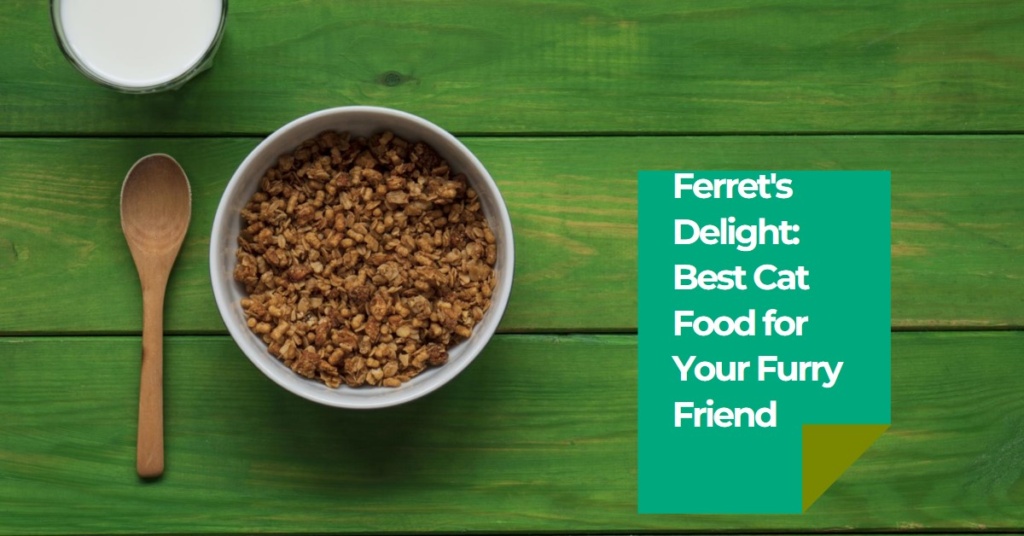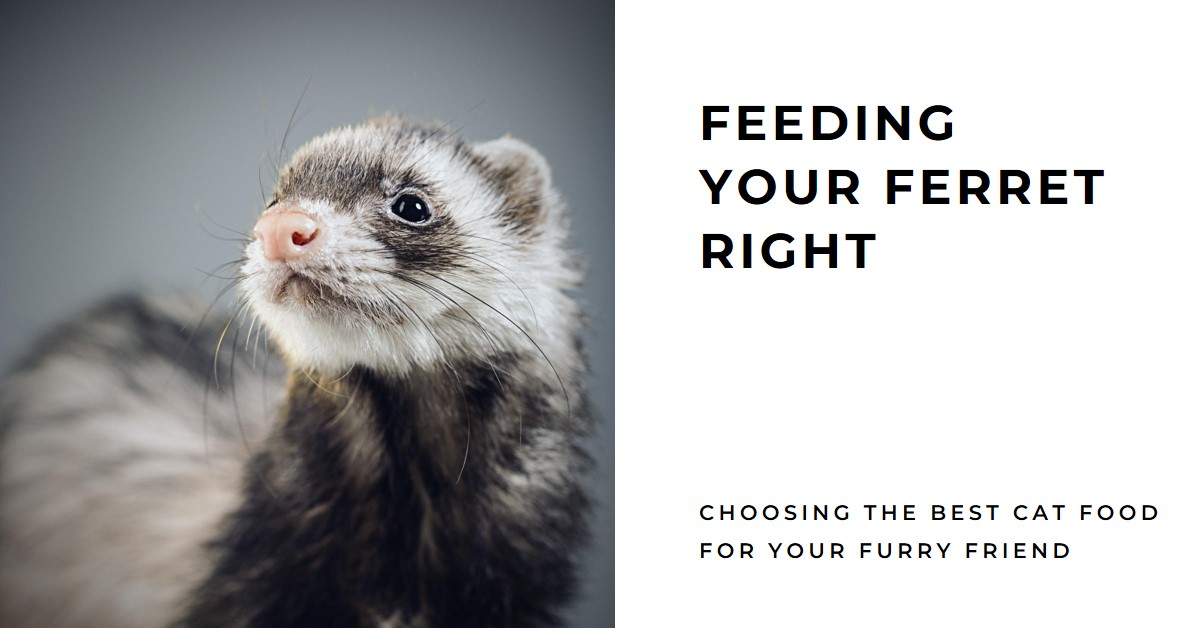Ferrets make excellent pets, but feeding them the right food is important to keep them healthy and happy. In this article, we will discuss different types of best cat food for ferrets that can be given to ferrets and why some foods are better choices than others. We will look at ingredients to choose and avoid. By the end, you will understand what food is best to buy for your furry friend so it stays solid and playful. Let’s get started!
Dry Cat Food or Wet Food?
When thinking about cat food for ferrets, the first question is whether to give dry or wet food. Dry food is easier to feed as it does not go bad quickly like wet food. Many ferret owners think dry food also cleans ferrets’ teeth.
But ferrets need moisture in their diet as they get very little moisture from dry food. Wet food gives ferrets the moisture they need. It is richer and more nutritious than dry food. Wet food also stops ferrets from eating, as they feel full soon. So wet food is a healthier choice.

Ingredients to Choose for Ferrets
The next important thing is the ingredients in best cat food for ferrets reddit. The first few ingredients listed are what ferrets will eat most. Choose foods where meat is the first ingredient, like chicken, turkey or fish. Meat gives ferrets protein to build strong muscles.
After the meat, look for ingredients like fruits and vegetables, which provide vitamins and fiber. Ingredients like peas and carrots are easy to digest for ferrets. Whole grains like wheat and barley are also good additions. Ensure sugar is low in the food or not listed, as ferrets do not need extra sugar.
Ingredients to Avoid
Some ingredients like corn, soy and by-products are not best for ferrets. Corn does not provide the nutrients ferrets need and may cause allergies. Soy is hard to digest. By-products refer to unnamed animal parts and should also be avoided. Food dyes and artificial preservatives are also best left out as they offer no benefit and may harm tiny ferret bodies. Foods with high sugar, salt or fat content are unhealthy for active ferrets. Check labels carefully to ensure the wet best cat foods for ferrets chosen to meet requirements.
Brands to Consider for Best cat food for ferrets
Once you understand what to look for in ingredients, here are some brands that offer wet best cat foods for ferrets suitable for ferrets:
- Weruva: The canned foods for ferrets have high meat content, like chicken and salmon, and contain good sources of vitamins and minerals with limited grain.
- Instinct: Raw frozen foods from Instinct mimic a natural raw ferret diet with meat, bones, and organs for complete nutrition.
- Nutro: Nutro Max wet foods have meat as the first ingredient and provide the proper balance of nutrients ferrets need. Their ferret-specific foods are also good.
- Merrick: Merrick, Before grain, wet foods have limited ingredients. Ferrets do best on turkey, salmon, and chicken with fruits and veggies.
Portion Size and Feeding Schedule
Feeding ferrets the correct portions based on their age, size, and activity levels is important. Young ferrets and those going through a growth spurt need more calories. Others require just the right amount to maintain a healthy weight. It is best to feed 2-3 times daily- morning, afternoon and evening.
This keeps metabolism active. Divide total daily portions into appropriate meal portions rather than free feeding. Make sure fresh water is available at all times.
Transitioning to a New Food
When changing a ferret’s diet to a new wet cat food, do it gradually over 7-10 days. Mix a small amount of new food with the old until ferrets get used to the taste and texture. Going slow prevents tummy upsets. Give small frequent meals to encourage eating new food without stress. Praise and reward trying new bites. Always transition during healthy periods, not sickness.
Homemade Recipes for Variety
For occasional variety, you can prepare simple homemade meals for ferrets, though the best wet cat food for ferrets is the best quality, providing balanced nutrition. Boil chicken or fish with bone-in and cut into small bites. Mix with chopped veggies and serve. You can also prepare meatloaf or meatballs using minced meat, eggs, and oats/rice as binders. Balance nutrients as the vet suggests to prevent health issues from homemade treats.
How to Handle Fussy Eaters
Some ferrets can be fussy eaters initially or during times of change or stress. In such cases, try hand-feeding new foods or small training with rewards. Gently scruff ferrets to open their mouths if needed. Warming canned food slightly also releases more aroma to attract. Play with fussy ferrets before feeding to work up your appetite. Be persistent and patient, as ferrets may take time to accept changes. Never leave hungry, as that makes matters worse.
Signs of Health Issues with Diet
Take note if ferrets start losing weight or have runny stools. Also, watch for lethargy, which could mean improper diet or allergies. Consult a vet to diagnose the cause and adjust food accordingly. Diet-related issues are usually easy to remedy with tweaks. Early attention prevents further complications. Don’t try drastic changes without guidance. You can ensure your furry friend’s good nourishment and well-being with caring attention.
Storing and Heating Wet Cat Food
For convenience, buy canned foods in multi-packs and store extras in the fridge. Check ‘best before’ dates. To serve, scoop out the required amount from the refrigerator into a small bowl—warm food slightly in the microwave on a low setting for older ferrets with weaker digestion. Constantly stir and check the temperature before serving. This softens texture and releases aromas to stimulate appetite. Maintaining the best cat foods for ferrets and following proper feeding practices are key to ferrets’ happy lives.
Snacks and Treats in Moderation
While a balanced diet should focus on good quality wet cat food as the staple, occasional healthy snacks, and treats can be included. For example, small pieces of boiled chicken and vegetables like cooked carrots and green beans make excellent snacks between meals. Minced meat, pureed mango, or banana also work well. However, keep portion sizes small. Avoid carb-heavy human snacks which ferrets don’t need. Remember, treats should not replace complete nutrition from cat food, but they can add variety now and then.
Food Bowls – The Right Set-Up
The food bowl is an important piece of ferret care. Stainless steel or ceramic bowls hold up best against bites and scratches without breaking. Place bowls away from the litter box in a comfortable spot. Ferrets like feeling secure when eating, so a covered food igloo works well. Refresh water several times daily and clean bowls daily to avoid germs. Keep multiple sets for convenient cleaning and to prevent upset tummy from sitting food.
Feeding Kits and Multiple Ferrets
If caring for more than one ferret, it’s smart to have individualized feeding kits. This avoids disputes and ensures each ferret gets proper nutrition. Feed several small meals daily in separate bowls rather than one significant portion. Don’t keep bowls too close, or fights may occur over food. Monitor the first few feedings with multiple ferrets to ensure all eat calmly without stress. With care and routine, group feeding can be managed smoothly.
Conclusion
The best cat foods for ferrets is preferable to dry kibble for ferrets. Look for high meat protein as the first ingredient, with limited grain, veggies, and fruits included as supplementals. Avoid corn, soy, by-products, or artificial ingredients.
Some brands like Weruva, Instinct, Nutro, and Merrick offer excellent wet food choices for ferrets that will keep them healthy, happy, and active. Consult your vet to decide which wet cat food best suits your ferret’s needs. With the proper diet, your little friend will flourish!
FAQs
Q1. At what age can ferrets start eating cat food?
Ferrets can start eating dry or wet kitten food from weaning at 4-5 weeks as long as it is softened.
Q2. How much cat food per day for my ferret?
The amount depends on age and size. Adult ferrets usually need 1/4 to 1/3 cup daily divided into meals.
Q3. Can ferrets eat both dry and wet food?
Feeding mostly wet food for moisture is best, and supplementing it with small dry kibble or home-prepared nuggets is also recommended.
Q4. My ferret won’t eat – what can I do?
Try hand-feeding, warming food, adding broth or scrambled eggs, and changing flavors weekly to keep interest.
Q5. Are grain-free cat foods also best for ferrets?
Yes, limited or no grain versions avoiding corn soy suit ferrets’ simple digestive system best for optimum health.
Also Read:
- The Best food for ragdoll cats in 2024
- Printable list of food cats can’t eat : Most Important for Pet owners


